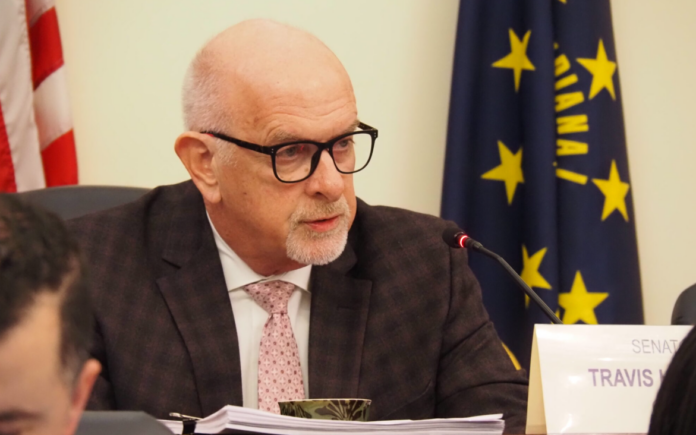By Whitney Downard
Indiana Capital Chronicle
Senate Republicans on Tuesday backed away from the most significant parts of Gov. Mike Braun’s property tax cut proposal.
Instead, their version of relief includes tightening requirements for schools to advance certain referendums, limiting how much property tax levies can grow and introducing a credit for first-time homebuyers.
The cost to units of government would be just shy of $300 million in the first year, according to the author.
Three Democrats voted against the measure, citing the lack of relief for renters and the uncertain impacts on schools. It moved out of the committee on a 10-3 vote.
An amendment struck large portions of Gov. Mike Braun’s property tax relief proposal, including the annual 3% cap on the growth of property tax bills. Senior citizens, families with children and low-income Hoosiers had growth capped at 2% under Braun’s plan.
It also removed increased deductions for homeowners. Overall, Braun’s plan would have resulted in an immediate 21% reduction in the average homeowner tax bill.
Under the new Senate proposal, taxpayers would see $1.4 billion in savings over the next three years. Braun’s plan would have saved $1.1 billion in its first year and $1.6 billion in its third year.
Sen. Travis Holdman, who authored Senate Bill 1, introduced the amended version in committee on Tuesday. Pulling back on Braun’s plan lessened the hit on local units of government, which rely on property taxes to pay for services like law enforcement, parks, libraries and fire safety.
“We have worked consistently with the governor’s office to get this to a good spot,” Holdman said. “We just think there’s a fine line that we have to walk to make sure that we are careful to be responsible to local government and, at the same time, provide some tax relief.”
In a statement, Braun’s office said the plan took “steps in the right direction” but said he would continue to work with legislators on the administrative priority.
“The Governor will carefully review the changes to his plan and looks forward to working with the House and Senate to strengthen the amended bill to include broad based and immediate property tax cuts for Hoosier homeowners who have been hit the hardest by skyrocketing home value inflation.”
Provisions of the Senate plan
The wide-ranging amendment introduced to the bill restricts school referendums to general election ballots in even-numbered years. Schools also can’t introduce such questions in back-to-back years, though there are exceptions for funding teacher salaries or school safety measures.
Much of the language mirrors Senate Bill 8, authored by Sen. Brian Buchanan, R-Lebanon. Buchanan said that referendums would need to include the total amount of money that would be raised by levying a property tax.
“There are some revisions to the ballot question in trying to make that very practical and straightforward for the voters,” Buchanan said.
Republican senators also opted to incorporate provisions from Senate Bill 9 into their property tax relief proposal, which freezes the maximum levy growth quotient for 2026 and then caps it for the following two years.
The maximum levy growth quotient currently limits how much local property tax levies can rise in a year based on a six-year rolling average of non-farm personal income growth. Because of inflation, it rose to 5% in 2023 compared to 3.4% in 2019. Lawmakers last year put in an artificial cap of 4% — when, without the cap, the maximum would’ve been 5.5%, according to the Indiana Office of Management and Budget.
The amended bill would freeze it for 2026 and then it could increase 1% in 2027 and 2% in 2028.

Previously, local units of government could petition to exceed that cap but they will no longer have that option — instead, they can place it before voters in a ballot question.
Sen. Linda Rogers, R-Granger, described a new method for counties to provide individual property tax relief though a payment deferral program, which she’d authored under Senate Bill 6. That process is coupled with deductions for disabled veterans and seniors.
“This is an opportunity for them to be able to help a homeowner that may be going through some very difficult times, or maybe a senior that’s on a fixed income,” Rogers said.
Homeowners will have the option to defer $500 of their property income tax annually until their home is sold. However, it’s unclear how many counties will opt to create such a program.
Finally, the bill introduces a first-time homebuyer tax credit, a first for Indiana. The credit assists those with incomes up to $75,000 buying a property that costs up to $250,000. Qualified individuals can get a $2,500 credit for five years after purchase.
Initial reaction
The Indiana Capital Chronicle reached out to a handful of local organizations to get an initial reaction to the amended bill.
Denny Costerison, speaking on behalf of the Indiana Association of School Board Officials, noted that the new version “lessen(ed) the negative impact on school corporations and other local government units,” but flagged concerns for educators.
The new cap on levy growth will “significantly” reduce property taxes collected over the next three years, which impacts budgets for local schools. Additionally, schools will be prohibited from issuing new general obligation bonds for two years after a current bond expires, he said.
“Many school corporations use this procedure on an annual basis to supplement their operating fund,” Costerison noted.
“Regarding school referendums, we appreciate the revised language … making it more understandable for voters,” Costerison said. “And that school operating and safety referendums will not be subject to the newly created one-year ‘cooling off’ period before another referendum could be proposed.”
Other entities called it an improvement from the original version.
David Bottorff, with the Association of Indiana Counties, highlighted the relief included for veterans, senior citizens and first-time homebuyers.
His organization also supports limiting referendums to even-numbered years, which have higher turnout.
But he said “the zero levy growth for 2026, and the limit(s) below inflation growth for 2027 and 2028 is a concern as locals will have increased expenses in operations for utilities, health care for employees, criminal justice, road maintenance and other critical government functions.”
Various other bills — including ones on personal property tax and assessed values of agriculture land — could further erode county revenues, leaving the governments with fewer resources.
Matt Greller, the chief executive officer of Advancing Indiana Municipalities, said he looked forward to working with both lawmakers and Braun’s team to finalize the bill. Future conversations could include a “possible replacement source” for shortfalls, Greller said.
“It does not serve Hoosier taxpayers well to overhaul the current system in a manner that does more harm than good. An unbalanced approach represents the worst possible outcome for taxpayers and the governmental units they rely on for safe, livable, affordable, and well-maintained and well-appointed communities,” he concluded.
The bill now moves to the full Senate for further consideration.
Editor-in-Chief Niki Kelly contributed to this story.
* * *
The Indiana Capital Chronicle is an independent, nonprofit news organization dedicated to giving Hoosiers a comprehensive look inside state government, policy and elections. The site combines daily coverage with in-depth scrutiny, political awareness and insightful commentary.





